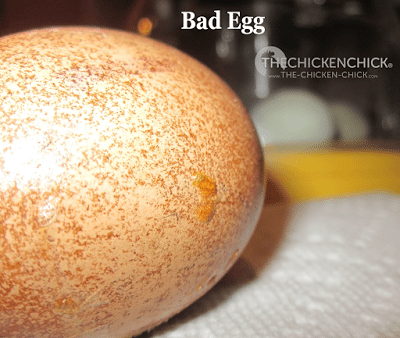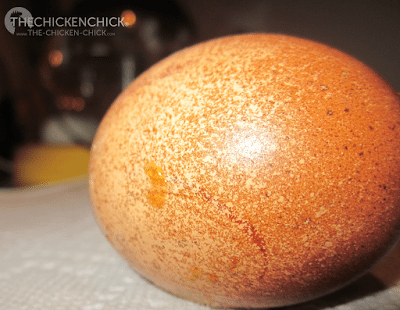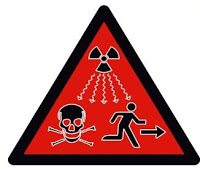Hatching addicts who have come across a rotten egg in their incubators never forget the smell. The odor is distinctive and unmistakable. Rancid does not begin to describe it. Why do incubated eggs go bad? Often, dirty eggs are the culprit. Bacteria from a dirty egg grows inside, turning the contents into a foul liquid, killing any embryo present. Gasses build up and generate pressure that may cause the egg to ooze or explode.
I rescued this egg from one of my fairweather broody hens, who had abandoned her nest after two weeks of sitting. The egg was no longer warm when I found it, which didn’t give me much hope for the embryo’s viability, but I placed it in my incubator hoping for the best a few days ago. Upon inspecting the eggs that had begun to hatch in the bator this morning, I immediately spotted the telltale, maple syrup-looking ooze that strikes fear into the heart of every hatcher. I knew what that innocent, honey-like substance signaled as I had seen it before. A stink bomb in danger of detonation. Must. Act. Quickly.
I took the egg out of the bator and placed it in two, zip-top bags and took it OUTSIDE. I’m just not a risk taker and the smell of a rotten egg is so pungent it could very well penetrate the confines of two sealed, plastic bags.
I always insist on knowing what lies within, so of course, I had to perform an eggtopsy (ie: crack that bad-boy open). My weapon of choice for this job is a heavy carving knife. I tap the blunt edge of the knife against the wide end of the egg (where the air sac would be) to crack it, being very careful not to puncture the bag. A nice, ripe egg will explode with balloon-like force and sound.
This egg, while rotten, did not explode. There was a well-advanced, decomposing embryo inside that, if given more time in the incubator, would have deteriorated further into greenish-black, liquified putresence. While I’m not ordinarily one to spare the photographic details of the graphic, I thought better of it this time. (you’re welcome)
When candling eggs, pay attention to any smell inside the bator to catch rotten eggs early. Bad eggs readily identify themselves and should be removed immediately.
Happy hatching!
Kathy Shea Mormino
Affectionately known internationally as The Chicken Chick®, Kathy Shea Mormino shares a fun-loving, informative style to raising backyard chickens. …Read on


shop my SPONSORS
Hatching addicts who have come across a rotten egg in their incubators never forget the smell. The odor is distinctive and unmistakable. Rancid does not begin to describe it. Why do incubated eggs go bad? Often, dirty eggs are the culprit. Bacteria from a dirty egg grows inside, turning the contents into a foul liquid, killing any embryo present. Gasses build up and generate pressure that may cause the egg to ooze or explode.
I rescued this egg from one of my fairweather broody hens, who had abandoned her nest after two weeks of sitting. The egg was no longer warm when I found it, which didn’t give me much hope for the embryo’s viability, but I placed it in my incubator hoping for the best a few days ago. Upon inspecting the eggs that had begun to hatch in the bator this morning, I immediately spotted the telltale, maple syrup-looking ooze that strikes fear into the heart of every hatcher. I knew what that innocent, honey-like substance signaled as I had seen it before. A stink bomb in danger of detonation. Must. Act. Quickly.
I took the egg out of the bator and placed it in two, zip-top bags and took it OUTSIDE. I’m just not a risk taker and the smell of a rotten egg is so pungent it could very well penetrate the confines of two sealed, plastic bags.
I always insist on knowing what lies within, so of course, I had to perform an eggtopsy (ie: crack that bad-boy open). My weapon of choice for this job is a heavy carving knife. I tap the blunt edge of the knife against the wide end of the egg (where the air sac would be) to crack it, being very careful not to puncture the bag. A nice, ripe egg will explode with balloon-like force and sound.
This egg, while rotten, did not explode. There was a well-advanced, decomposing embryo inside that, if given more time in the incubator, would have deteriorated further into greenish-black, liquified putresence. While I’m not ordinarily one to spare the photographic details of the graphic, I thought better of it this time. (you’re welcome)
When candling eggs, pay attention to any smell inside the bator to catch rotten eggs early. Bad eggs readily identify themselves and should be removed immediately.
Happy hatching!





























I'd continue on. Clean up the best you can and hope for the best.
This is our first time incubating eggs and this has been a real challenge. We made a homemade incubator and keeping the temp and humidity close has been the worst. Like I said this has been our first time so we have learned alot in this process. Any way on day 18 when it is time for our sweet little chicks to hatch we noticed a crack starting on one of the eggs, we waited and nothing happened until up in the night. the crack went on around the egg, but there was an awful smell going on, way worse… Read more »
WE Found Several Of These In Our Incubator Of Duck Eggs. All But 5 Had To Be Tossed, But Those 5 Look Like We Saved Them In Time!
I rescued about a dozen eggs that my hens stopped setting a few weeks ago. Upon candling I discovered a very smelly egg. Of course you always hope it's just your imagination. Definitely about to bag the stinker up. Also, my eggs seem to all be at different stages of incubation. What gives?
damn,thanks for this blog post;it is forever useful though not what had wanted to hear-one of mine is doing exactly the same thing plus oozing to. the beloved light sussex cockerel of mine was kidnapped this month and am on the only batch left of his girls eggs, one of the eggs had had a crack in it,shoud have known better but had tried to make the most out of a bad situation and after sterilizing,used gaffer tape on the crack,the membrane hadnt been damaged so didnt think itd be a dead end. am going to bury the egg tomorow.